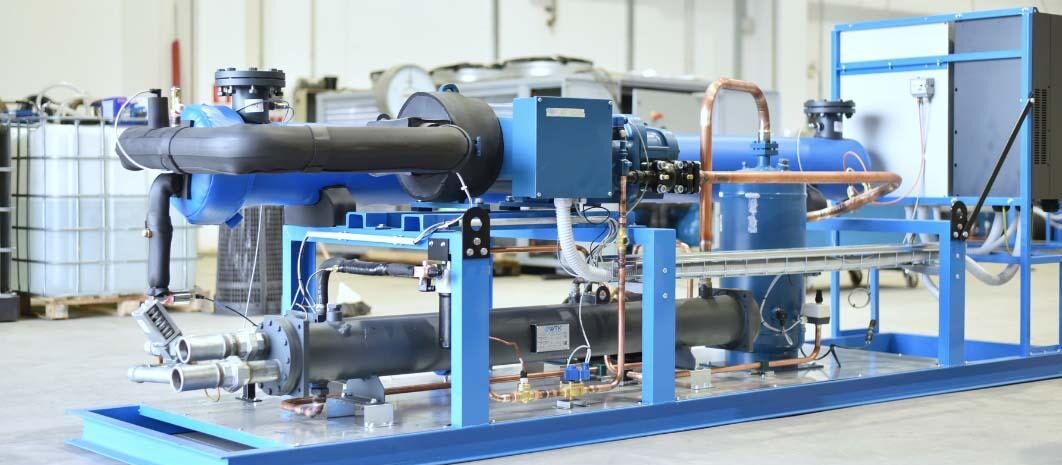Chiller Selection for Pharmaceuticals
Introduction
Chillers play a vital role in pharmaceutical production, ensuring precise temperature control across a wide range of processes such as chemical synthesis, fermentation, and the storage of temperature-sensitive products. Selecting the right chiller is critical not only for maintaining product quality but also for ensuring compliance with stringent industry standards. Pharmaceutical Chiller
Temperature Control Precision
Tight Temperature Control: Pharmaceuticals often require precise temperature management to ensure product quality and stability. Chillers must provide consistent cooling with minimal temperature fluctuations, especially in critical applications like drug manufacturing or vaccine storage.
Low-Temperature Capabilities: Some processes, such as cryogenic cooling or the preservation of biological samples, may require chillers capable of reaching ultra-low temperatures.
Hygienic and Sanitary Design
Cleanability: Chillers used in pharmaceutical production should have a sanitary design to prevent contamination. Stainless steel heat exchangers, smooth surfaces, and components that can be easily cleaned are essential to maintain hygiene.
Compliance with Regulations: Ensure that the chiller design complies with industry regulations such as FDA, GMP (Good Manufacturing Practices), or cGMP (current Good Manufacturing Practices) standards. These standards ensure that equipment is safe and suitable for pharmaceutical production.
Process-Specific Requirements
Process Cooling: Chillers are often used to maintain controlled temperatures during chemical reactions, mixing, or formulation stages. The cooling requirements vary depending on the process, so it’s essential to select a chiller that meets the specific temperature range.
Storage Cooling: In addition to process cooling, chillers are used to maintain the temperature of storage areas for temperature-sensitive materials, such as vaccines, biological samples, or active pharmaceutical ingredients (APIs).
Compact and Space-Saving Design
Space Constraints: In pharmaceutical facilities where space is at a premium, compact chillers that offer a small footprint are essential. Look for chillers that maximize cooling capacity while minimizing their physical size to make the most of limited floor space.
Vertical or Stackable Options: Some chillers are designed to be stackable or vertically oriented, which can be an ideal solution for facilities with height availability but limited floor space.
Redundancy and Backup Systems
Critical Redundancy: Given the importance of maintaining consistent temperature control in pharmaceutical processes, many facilities opt for chillers with built-in redundancy. This could involve having dual compressors, backup chillers, or parallel systems that can seamlessly take over if the primary chiller fails.
Hot Standby Systems: For critical applications, such as the storage of temperature-sensitive drugs, hot standby chillers that are always ready to take over in case of failure can be a vital safeguard.
Glycol Compatibility
Glycol-Water Mixture: Many pharmaceutical processes require the use of glycol-water mixtures for cooling. Ensure that the selected chiller is compatible with the specific glycol mixture and concentration required by your application.
Custom Mixtures: Some pharmaceutical applications may need custom glycol-water mixtures tailored to precise temperature control or environmental needs.
Environmental Considerations
Refrigerant Selection: Choose chillers that use environmentally friendly refrigerants with low Global Warming Potential (GWP) and Ozone Depletion Potential (ODP). Many pharmaceutical companies are transitioning to sustainable refrigerants to align with environmental regulations and corporate sustainability goals.
Water Conservation: Water-cooled chillers are common in pharmaceutical applications, but water conservation should be considered. Closed-loop cooling systems or chillers with high-efficiency cooling towers can reduce water usage while maintaining effective cooling.
Sustainability and Green Manufacturing
Eco-Friendly Coolants: Many pharmaceutical companies are adopting sustainability practices, including the use of eco-friendly refrigerants with low environmental impact. Chillers that use natural refrigerants, such as CO2, ammonia, or hydrocarbons, align with green manufacturing goals and help reduce the carbon footprint.
Energy Optimization Systems: Advanced chillers with energy optimization systems, such as demand-based cooling and variable flow control, can contribute to a facility’s overall sustainability efforts by reducing energy waste.
Industry-Specific Customizations
Special Coatings: In some pharmaceutical processes, the cooling equipment may be exposed to aggressive chemicals or corrosive environments. Option for chillers with special coatings or materials that resist chemical corrosion and ensure long-term durability.
Specialized Filtration Systems: Certain pharmaceutical applications may require chillers equipped with specialized filtration systems to ensure that the cooling fluid remains clean and free of particulates, which is crucial for maintaining product purity and preventing contamination.
When selecting a chiller for pharmaceutical applications, it’s essential to go beyond basic cooling capabilities and consider the specific requirements of your processes. Factors like noise control, compact design, advanced monitoring systems, and sustainability efforts all play a role in making the best choice for your facility. By taking a comprehensive approach and considering both operational efficiency and regulatory compliance, you can ensure that your chiller system meets the high standards demanded by the pharmaceutical industry.





